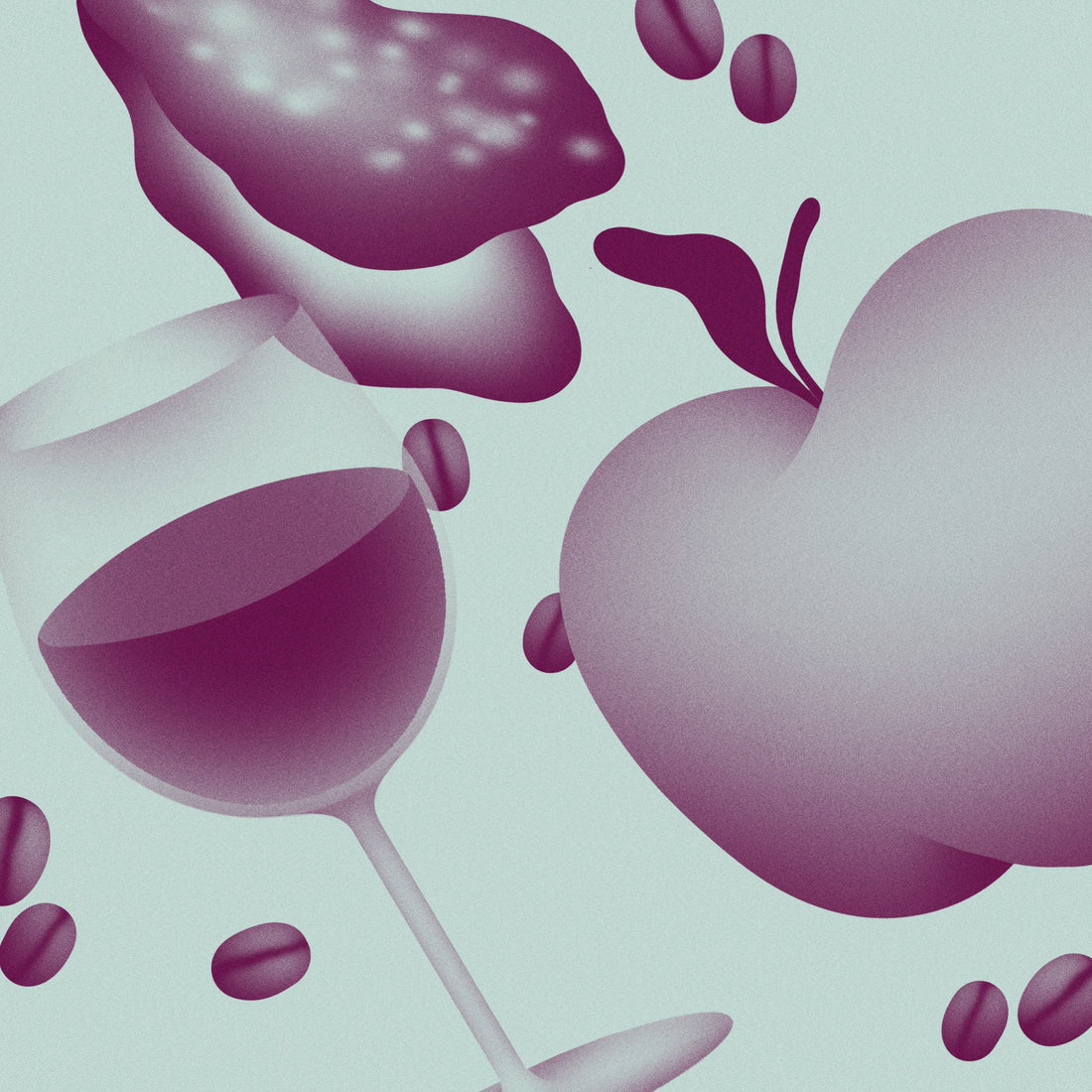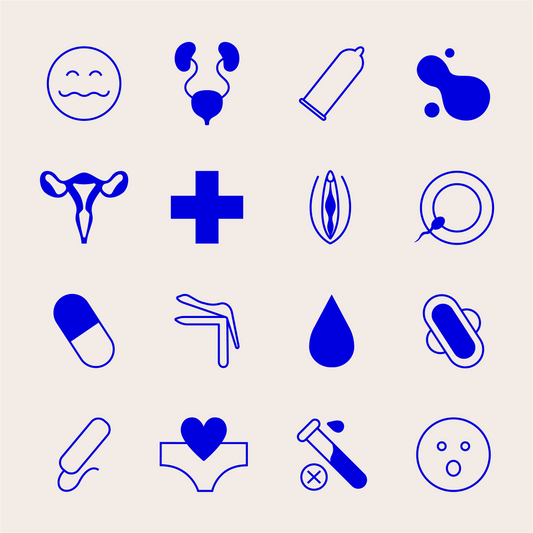If we’ve found ourselves on Dame’s website, it’s probably a no-brainer that we’re prioritizing our sexual wellness- an essential aspect of overall health and happiness. While many factors contribute to a fulfilling intimate life, nutrition can be easily overlooked. We can’t ignore nutrition as a key player in sexual health.
The food we consume plays a crucial role in supporting various physiological functions, including those related to sexual health. Let’s explore the intricate relationship between nutrition and sexual wellness, shedding light on how a balanced diet can enhance intimacy and overall well-being.
Nutrition affects hormones, hormones affect sexual wellness
Hormones are chemical messengers in the blood- sending signals from one part of your body to another. Hormones work slowly and play a massive role in mood, libido, metabolism. But in order to actually make those hormones, you need to be taking in enough nutrients- both macronutrients and micronutrients. These nutrients regulate hormone production, support the nervous system and maintain healthy blood flow, all of which are vital for sexual wellness.
Macronutrients
The three macronutrients (or macros, shoutout to my gym bros) - carbohydrates, protein and fats, are the essential building blocks for hormones and our overall health. A diet needs to include an adequate balance of macronutrients. What’s considered balanced? That depends on a lot of factors, like body mass and activity level. Working with a registered dietician, or checking out an online tool like MyPlate can help you learn what your body needs.
Carbohydrates
Carbohydrates are the main source of energy for the body, as well as the primary fuel for the brain. They provide quick and easily accessible energy to burn when you’re in the sack. Carbohydrates can also be stored as glycogen and accessed during endurance activities, like having sex for hours. If the body’s lacking carbohydrates, it can break down protein and fats to create carbohydrates, but these are energetically expensive processes that can lead to production of ketones or loss of muscle mass.
Protein
Lean sources of protein, such as poultry, fish, beans, and tofu, provide the body with essential amino acids. These are crucial for maintaining muscle mass, which is important for sexual health and stamina. Proteins also support the production of neurotransmitters like dopamine and serotonin, which play a role in sexual desire and pleasure. But to get these benefits, make sure you’re taking in enough total protein, and enough protein at one time. Current evidence for folks with moderate physical activity supports consuming 0.8g/kg of body weight per day, and up to 1.7g/kg of body weight for strength and endurance athletes. Taking in 25-30g at a time is also the minimum required to actually stimulate muscle synthesis- that’s four eggs, one scoop of protein powder, or a 4 oz piece of chicken.
Fats
Fats can often seem like a mixed bag, and had a bad rap for a long time, as we witnessed in diets of the 1990s.But avoiding fats completely definitely isn’t the answer- essential fatty acids, such as omega-3 and omega-6, and even cholesterol are crucial for hormone production and overall cellular health. Sources of unsaturated fats include fatty fish like salmon, avocados, nuts, and seeds. These nutrients help regulate sex hormone production, which directly impacts libido and sexual function.
However, excessive intake of saturated and trans fats (unsaturated fats chemically converted to saturated fats) can be a real problem. These types of fat are linked to cardiovascular diseases, such as atherosclerosis, where the arteries lose their elasticity and become thick and hard. As we learned in the arousal cycle, good blood flow is crucial for great sex, from achieving an erection to increasing vaginal lubrication. Finding a balance between unsaturated and saturated fats can help you maintain hormone production while keeping your circulation top notch.
Micronutrients
Micronutrients play a lesser but still significant role in sexual wellness. Micronutrients include things like vitamins and minerals.
- Vitamin D, from foods like fatty fish and dairy products and especially from sunlight, may be linked to increased testosterone levels in men
- Zinc, found in oysters, seeds and lean meat, is essential for sperm production and sexual function
- Antioxidants, found in fruits and vegetables, help combat oxidative stress, which can contribute to sexual dysfunction. Increased intake of antioxidants can reduce the risk of erectile dysfunction
- Berries, leafy greens, and nuts are excellent sources of antioxidants like vitamins C and E. They improve blood flow, ensuring that vital areas receive adequate circulation.
Undereating: when hormones go haywire
It’s important not only to pay attention to what you eat, it’s also ensuring that you’re eating enough. What happens when we’re missing out on macronutrients, or enough calories in general? Undernourishment affects hormone production, and can lead to fatigue, nervous system disorders, changes in mood and decreased bone density. But it’s not always as simple as someone voluntarily depriving themself of calories.
Appetite can be complex, regulated by the hormones leptin and ghrelin, and many things can influence someone’s caloric intake, like eating disorders, medical conditions, medications, or psychosocial barriers. All of these things can put a damper on our sexual wellness. If you’re struggling with an eating disorder, help is available.
What about aphrodisiacs?
Ahhhh, the age old question: can I eat my way to a stronger libido? Aphrodisiacs are foods and beverages that have historically been thought to increase sex drive. But do they work? Short answer: maybe, and likely in an indirect way. While these foods likely won’t supercharge your libido, they may improve hormone production and circulation, which are also critical components of sexual wellness.
- Oysters: probably the most famous aphrodisiac, primarily due to their high zinc content. Zinc is crucial for testosterone production and sperm health, making oysters a valuable addition to a diet aimed at enhancing sexual wellness.
- Dark chocolate: contains phenylethylamine, a mild stimulant that releases endorphins and enhances feelings of pleasure. It also contains antioxidants that support heart health, vital for overall sexual well-being.
- Pomegranates: packed with antioxidants, particularly ellagic acid, which can improve blood flow and support erectile function. They also have a positive impact on overall cardiovascular health.
- Avocado: rich in healthy fats, which we learned earlier support hormone production. Additionally, it contains vitamin E, a potent antioxidant that supports cardiovascular health, essential for robust sexual function.
- Spinach: rich in magnesium, a mineral that plays a role in muscle and nerve function. It also contains folate, which supports the production of histamines, crucial for sexual pleasure and arousal.
A balanced and nutrient-rich diet is fundamental to maintaining sexual wellness. By incorporating a variety of whole foods that provide essential macronutrients, micronutrients, and antioxidants, you can support hormone production, enhance blood flow, and ensure optimal nervous system function. Remembering too, however, that nutrition is just one piece of the puzzle in sexual wellness. Maintaining a healthy body, communication, and mental health are all essential in achieving a satisfying and fulfilling intimate life.
























































